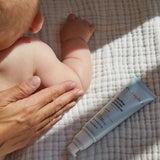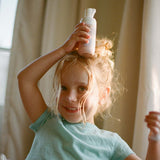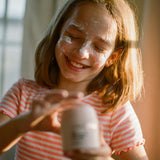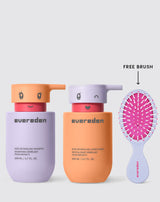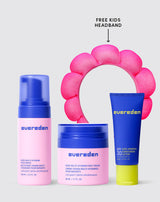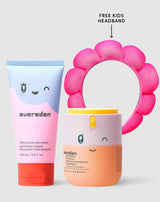In collaboration with Ovia Health—a family of apps for every stage: from cycle tracking and trying to conceive, to pregnancy and parenthood. Download the app that's right for you to get daily, personalized family health support.
Now that you’re pregnant, you may be wondering if you need to change any of your regular habits. Can you color your hair? Use all your usual beauty products? Get a manicure? And what about painting the nursery?
You come into contact with a wide range of chemicals every day because, well… everything is a chemical—even water. That said, you may want to avoid certain synthetic chemicals found in cosmetics, cleaning formulas, and household products. Here’s what the research can tell us.
Hair dye
Black, blond, brown, red, or purple—whatever your shade, you can dye your hair during pregnancy. The main concern is about chemicals in the dye absorbing through your scalp and entering your bloodstream. But according to the Mayo Clinic, the skin absorbs a limited amount of any product, and the minimal amount isn’t believed to pose any harm to you or your developing baby.
To play it safe, color your hair in a well-ventilated area, and don’t leave the dye on your hair for longer than directed. If you want to avoid dye on your scalp completely, you could opt for a chic ombre look during pregnancy.
Nail polish
There aren’t any known risks of painting your nails while pregnant. Some nail polishes contain phthalates, which could be harmful in high doses. However, the small amount in nail lacquer shouldn’t pose any risk.
Chemicals found in nail polish and nail polish remover (including paraffin, formaldehyde, and acetone) can create fumes, whether at home or in a nail salon. But as long as there’s a window or door open, you probably don’t need to worry about breathing in chemicals. That said, if you feel dizzy or nauseous, you may want to pause the manicure and get some fresh air.
Face and body products
So, what about other cosmetics, like skin and body care? Products containing retinoids should generally be avoided because they’ve shown to increase the risk of certain birth defects. Salicylic acid that is applied to the skin is generally considered safe during pregnancy, but should not be taken orally at 325 mg or higher, for example in the form of adult aspirin (acetylsalicylic acid). On the other hand, studies have shown that low dose aspirin (about81 mg/day) prescribed by a medical professional can prevent or delay preeclampsia and does not increase the chance of complications or birth defects.
But you might be glad to hear most other common skincare ingredients are considered safe during pregnancy. AHAs (alpha-hydroxy acids) like glycolic acid and lactic acid have the green light since they don’t soak into the skin. Sunscreen, self-tanner, and skincare products with benzoyl peroxide, hyaluronic acid, vitamin C, and glycerin are thought to be safe as well.
Bug spray
As you know, using a bug spray can lower your chances of being bitten. Though insect bites can be harmless or nothing more than annoying, they can also cause various skin infections and diseases. It’s particularly important to avoid mosquito bites if you live in an area affected by Zika virus.
While there are different kinds of bug sprays you can buy, products containing DEET tend to offer the best protection. You may have heard about potential side effects of DEET, but there’s currently no evidence that it’s harmful to pregnant folks or their developing babies.
House paint
House paints sold today often have very low amounts of VOCs (volatile organic compounds) or none at all. For this reason, it’s unlikely that painting a room or hanging out near a paint job will harm you or your baby.
If you want to be on the safe side, steer clear of fumey solvent-based paints, latex paints, and spray paints, and leave stripping old paint to someone else to avoid lead exposure. Your best bet is to paint in a well-ventilated area using a water-based paint labeled “low-VOC” or “zero VOC.”
Cleaning products and detergents
According to the CDC, heavy exposure to high-level chemical disinfectants might increase the risk of miscarriage or preterm birth. However, these “high-level” cleaners are typically used in healthcare facilities, salons, and other public spaces to sterilize equipment and shared surfaces. Most household cleaners are safe to use during pregnancy as long as you use them as directed, work in a well-ventilated area, and wear gloves if necessary.
Pesticides
Pesticides are used to kill weeds, fungi, insects, and other pests like rodents in yards and gardens. Exposure to these chemicals has been linked to miscarriages and birth defects. Since there’s no known “safe level,” it’s best to avoid using pesticides and limit your exposure.
Since pesticides are used in farming, residues are sometimes detected on produce. Consuming small amounts is generally thought to be safe, but it’s still a good idea to thoroughly wash or peel your fruits and veggies before eating them. Also, eating organic produce whenever possible can help limit your exposure to pesticides during pregnancy.
Reviewed by the Ovia Health Clinical Team
Sources
- Tobah, Y. B. Is it OK to use hair dye during pregnancy? Mayo Clinic. Mayo Foundation for Medical Education and Research. 2017. http://www.mayoclinic.org/healthy-lifestyle/pregnancy-week-by-week/expert-answers/hair-dye-and-pregnancy/faq-20058484
- Romeo, A RN, PhD. Nailing Down the Facts: Nail Treatment Safety in Pregnancy. MotherToBaby. 2018. Web. https://mothertobaby.org/baby-blog/nailing-down-the-facts-nail-treatment-safety-in-pregnancy/
- Trivedi, Kroumpouzos, & Murase. A review of the safety of cosmetic procedures during pregnancy and lactation. International Journal of Women’s Dermatology. 2017. Web. https://www.sciencedirect.com/science/article/pii/S2352647517300059
- Bozzo, Chua-Gocheco, & Adrienne Einarson. Safety of skin care products during pregnancy. Official Journal of the College of Family Physicians of Canada. 2011. Web. https://www.ncbi.nlm.nih.gov/pmc/articles/PMC3114665/
- Michigan Medicine Healthwise Staff. Insect Repellents Topic Overview. University of Michigan. 2020. Web. https://www.uofmhealth.org/health-library/uf4815
- National Health Service (NHS). Can paint fumes affect my unborn baby? 2020. Web. https://www.nhs.uk/common-health-questions/pregnancy/can-paint-fumes-affect-my-unborn-baby/
- The National Institute for Occupational Safety and Health (NIOSH). Reproductive Health and the Workplace: Chemical Disinfectants and Sterilants. Centers for Disease Control and Prevention (CDC). 2019. Web. https://www.cdc.gov/niosh/topics/repro/disinfectants.html
- The National Institute for Occupational Safety and Health (NIOSH). Reproductive Health and the Workplace: Pesticides. Centers for Disease Control and Prevention (CDC). 2019. Web. https://www.cdc.gov/niosh/topics/repro/pesticides.html
- Roberts, C. Stop Eating Pesticides. Consumer Reports. 2020. Web. https://www.consumerreports.org/pesticides-in-food/stop-eating-pesticides/


